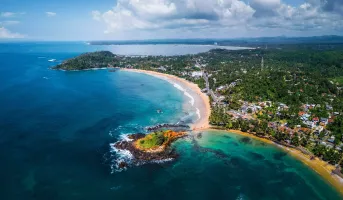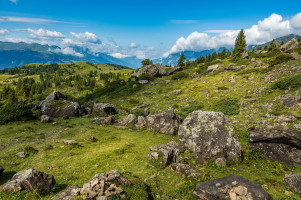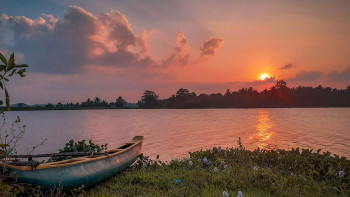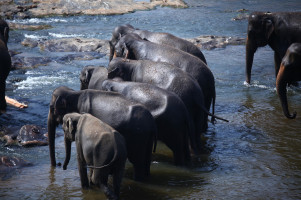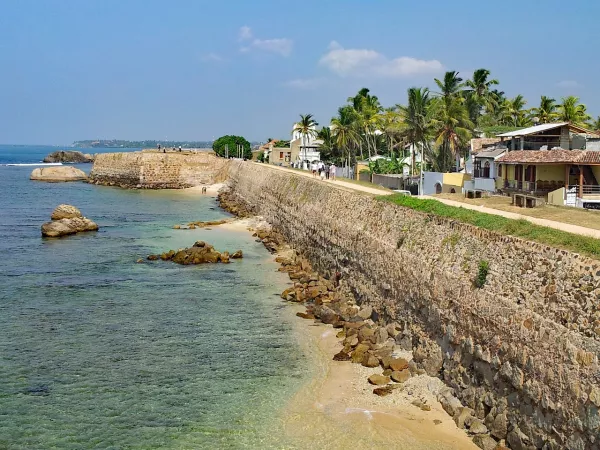
Galle Travel Guide
Galle, located in the southern part of Sri Lanka, is a charming city known for its rich history, stunning colonial architecture, and vibrant culture. This coastal city boasts a strategic location that has made it a significant trading port throughout the centuries. Galle is famous for its well-preserved fort, which is a UNESCO World Heritage Site and a testament to its colonial past. The city is a melting pot of cultures, blending European influences with traditional Sri Lankan heritage.Top Attractions in Galle
- Galle Fort
- Unawatuna Beach
- Japanese Peace Pagoda
- National Maritime Museum
- Galle Dutch Reformed Church
Galle is Famous for
Galle is most famous for its well-preserved Galle Fort, a 16th-century Dutch fortress that offers a glimpse into the city's colonial past.Top Attractions in Galle
- Explore the charming streets of Galle Fort
- Relax on the pristine beaches of Unawatuna
- Visit the iconic Galle Dutch Reformed Church
- Take a scenic boat ride in the Galle Harbor
- Discover the rich maritime history at the National Maritime Museum
What's Great about Travelling to Galle?
- Rich cultural heritage
- Beautiful beaches
- Historic architecture
- Warm and welcoming locals
What's Not So Great about Travelling to Galle?
- Crowded during peak tourist seasons
- Humid climate in certain months
- Limited public transportation options
- Language barrier for non-Sinhalese speakers
Travel Tips for Galle
- Check visa requirements before traveling
- Opt for tuk-tuks or private cars for transportation
- Stay hydrated and wear sunscreen due to the tropical climate
- Respect local customs and traditions
Important Galle trip information
- Ideal Duration: 3-4 days
- Best Time to Visit: December to March
- Nearby Airports and Railway Stations: Bandaranaike International Airport, Colombo
Per Person
31,499
*EXCLUDING APPLICABLE TAXES 4.9 Ratings
( 185 Reviews )
( 185 Reviews )
Per Person
19,300
*EXCLUDING APPLICABLE TAXES 4.9 Ratings
( 185 Reviews )
( 185 Reviews )
Per Person
17,560
*EXCLUDING APPLICABLE TAXES Per Person
20,550
*EXCLUDING APPLICABLE TAXES Per Person
50,440
*EXCLUDING APPLICABLE TAXES 4.9 Ratings
( 200 Reviews )
( 200 Reviews )
Per Person
23,150
*EXCLUDING APPLICABLE TAXES FAQ's on Galle
Q1: What is the best time to visit Galle?
The best time to visit Galle is from November to March when the weather is dry and pleasant, making it ideal for exploring the city and its surroundings. This period also coincides with the peak tourist season when many festivals and events take place, offering a vibrant cultural experience.
Q2: Do I need a visa to travel to Galle?
Tourists visiting Galle typically require a visa to enter the country. However, some countries may be eligible for visa-free entry or visa on arrival. It is important to check the specific visa requirements based on your nationality and make necessary arrangements before your trip.
Q3: What are the must-visit attractions in Galle?
Galle is known for its UNESCO-listed Galle Fort, a historic colonial town with charming streets, museums, and boutique shops. Other must-visit attractions include the Dutch Reformed Church, Maritime Museum, and the picturesque Unawatuna Beach for relaxation and water activities.
Q4: Is Galle a safe place to travel?
Galle is generally considered a safe destination for travelers. However, it is advisable to exercise caution in crowded areas and be mindful of your belongings. It is recommended to avoid isolated areas at night and follow basic safety precautions during your visit.
Q5: What is the local currency in Galle and can I use credit cards?
The local currency in Galle is the Sri Lankan Rupee (LKR). While credit cards are accepted at hotels, restaurants, and larger establishments, it is advisable to carry cash for small purchases and when visiting local markets. ATMs are also available in the city for convenient currency exchange.
Q6: What is the local cuisine like in Galle?
Galle offers a diverse culinary scene with influences from Sri Lankan, Dutch, and Portuguese cuisines. Must-try dishes include rice and curry, hoppers, and seafood specialties like fish ambul thiyal. Vegetarian options are also widely available, and visitors can enjoy fresh tropical fruits and refreshing beverages like king coconut water.
Q7: What transportation options are available in Galle?
Transportation options in Galle include tuk-tuks, buses, and taxis for getting around the city and nearby areas. Renting a car or scooter is also a popular choice for more flexibility in exploring the region. Additionally, guided tours and boat rides are available for experiencing Galle's cultural and natural attractions.
Q8: Are there any cultural norms or etiquette I should be aware of when visiting Galle?
When visiting Galle, it is important to respect local customs and traditions. Modest dress is recommended when visiting religious sites, and it is customary to remove shoes before entering temples or homes. Greeting locals with a smile and a slight bow is considered polite, and it is advisable to ask for permission before taking photos of individuals. Embracing the local culture with an open mind and showing gratitude towards hospitality will enhance your experience in Galle.
Q9: I am a travel agent. How can I buy travel leads of Galle?
Register yourself as a travel agent at agents.tripclap.com and then you can buy travel leads to Galle once your account is approved. For more details contact our support team at +91-8069186564 or support@tripclap.com

